unit 1 time-conscious Americans 美国人的时间观念(课堂PPT)
- 格式:ppt
- 大小:4.69 MB
- 文档页数:94
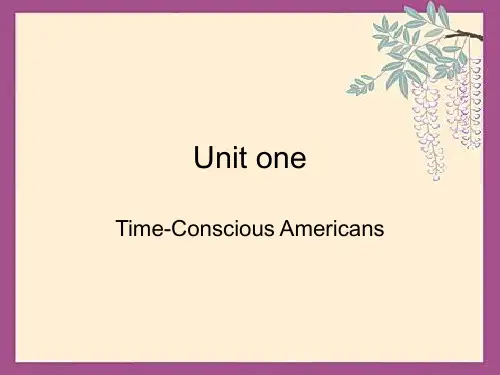
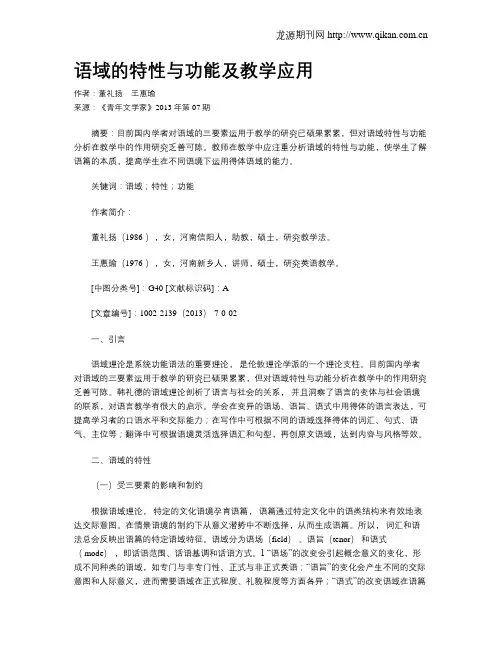
语域的特性与功能及教学应用作者:董礼扬王惠瑜来源:《青年文学家》2013年第07期摘要:目前国内学者对语域的三要素运用于教学的研究已硕果累累,但对语域特性与功能分析在教学中的作用研究乏善可陈。
教师在教学中应注重分析语域的特性与功能,使学生了解语篇的本质,提高学生在不同语境下运用得体语域的能力。
关键词:语域;特性;功能作者简介:董礼扬(1986-),女,河南信阳人,助教,硕士,研究教学法。
王惠瑜(1976-),女,河南新乡人,讲师,硕士,研究英语教学。
[中图分类号]:G40 [文献标识码]:A[文章编号]:1002-2139(2013)-7-0-02一、引言语域理论是系统功能语法的重要理论,是伦敦理论学派的一个理论支柱。
目前国内学者对语域的三要素运用于教学的研究已硕果累累,但对语域特性与功能分析在教学中的作用研究乏善可陈。
韩礼德的语域理论剖析了语言与社会的关系,并且洞察了语言的变体与社会语境的联系,对语言教学有很大的启示。
学会在变异的语场、语旨、语式中用得体的语言表达,可提高学习者的口语水平和交际能力;在写作中可根据不同的语域选择得体的词汇、句式、语气、主位等;翻译中可根据语境灵活选择语汇和句型,再创原文语域,达到内容与风格等效。
二、语域的特性(一)受三要素的影响和制约根据语域理论,特定的文化语境孕育语篇,语篇通过特定文化中的语类结构来有效地表达交际意图。
在情景语境的制约下从意义潜势中不断选择,从而生成语篇。
所以,词汇和语法总会反映出语篇的特定语域特征。
语域分为语场(field)、语旨(tenor)和语式( mode),即话语范围、话语基调和话语方式。
1 “语场”的改变会引起概念意义的变化,形成不同种类的语域,如专门与非专门性、正式与非正式英语;“语旨”的变化会产生不同的交际意图和人际意义,进而需要语域在正式程度、礼貌程度等方面各异;“语式”的改变语域在语篇意义上的差异,如口头还是书面交际,是有准备的还是即兴的。
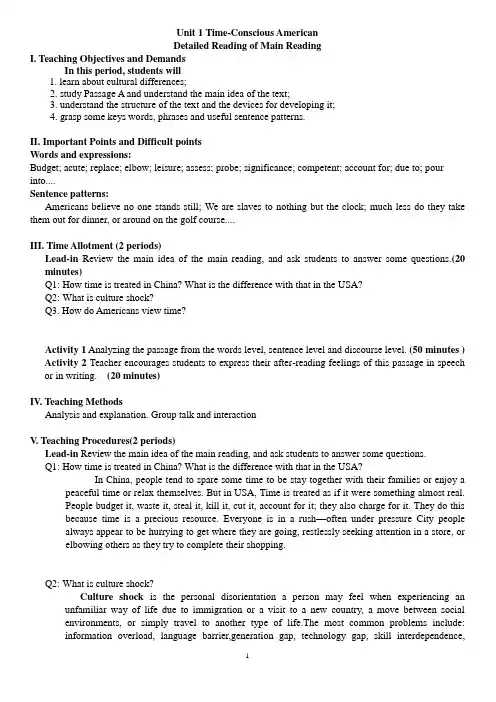
Unit 1 Time-Conscious AmericanDetailed Reading of Main ReadingI. Teaching Objectives and DemandsIn this period, students will1. learn about cultural differences;2. study Passage A and understand the main idea of the text;3. understand the structure of the text and the devices for developing it;4. grasp some keys words, phrases and useful sentence patterns.II. Important Points and Difficult pointsWords and expressions:Budget; acute; replace; elbow; leisure; assess; probe; significance; competent; account for; due to; pour into....Sentence patterns:Americans believe no one stands still; We are slaves to nothing but the clock; much less do they take them out for dinner, or around on the golf course....III. Time Allotment (2 periods)Lead-in Review the main idea of the main reading, and ask students to answer some questions.(20 minutes)Q1: How time is treated in China? What is the difference with that in the USA?Q2: What is culture shock?Q3. How do Americans view time?Activity 1 Analyzing the passage from the words level, sentence level and discourse level. (50 minutes ) Activity 2 Teacher encourages students to express their after-reading feelings of this passage in speech or in writing. (20 minutes)IV. Teaching MethodsAnalysis and explanation. Group talk and interactionV. Teaching Procedures(2 periods)Lead-in Review the main idea of the main reading, and ask students to answer some questions.Q1: How time is treated in China? What is the difference with that in the USA?In China, people tend to spare some time to be stay together with their families or enjoy a peaceful time or relax themselves. But in USA, Time is treated as if it were something almost real.People budget it, waste it, steal it, kill it, cut it, account for it; they also charge for it. They do this because time is a precious resource. Everyone is in a rush—often under pressure City people always appear to be hurrying to get where they are going, restlessly seeking attention in a store, or elbowing others as they try to complete their shopping.Q2: What is culture shock?Culture shock is the personal disorientation a person may feel when experiencing an unfamiliar way of life due to immigration or a visit to a new country, a move between social environments, or simply travel to another type of life.The most common problems include: information overload, language barrier,generation gap, technology gap, skill interdependence,formulation dependency, homesickness (cultural), infinite regress (homesickness), boredom (job dependency), response ability (cultural skill set). There is no true way to entirely prevent culture shock, as individuals in any society are personally affected by cultural contrasts differently.Q3. How do Americans view time?Time is treated by Americans as if it were something almost real. People budget it, waste it, steal it, kill it, cut it, account for it; they also charge for it. They do this because time is a precious resource.Everyone is in a rush—often under pressure City people always appear to be hurrying to get where they are going, restlessly seeking attention in a store, or elbowing others as they try to complete their shopping.Activity 1 Analyzing the passage from the words level, sentense level and discourse level.Background informationCultural differences: Students and teachers need to be aware that the ethnocentric attitudes ofwriters are precisely the way cultural conflict is encouraged. Why is understanding a culturealways the others’ responsibility? Is it not possible that each culture could be made awa re ofdifferent conventions? Both sides must work at rising above cultural differences and be willing tocompromise… and, in both cases, most likely neither side has access to the cultural conventionsof the other so blaming is not the answer.Language Points:Paragraph 1:1. Americans believe no one stands still. (Para. 1)Meaning: Americans believe no one keeps motionless; everyone moves.Here "stand" means "keep or stay in a particular position or state". In this sense, "stand" is followed by adjectives. More examples:The room stands idle. 这房间闲置着。
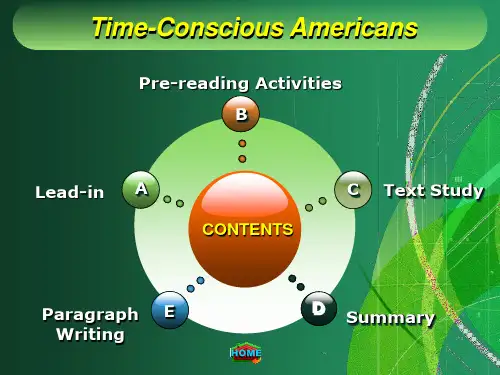
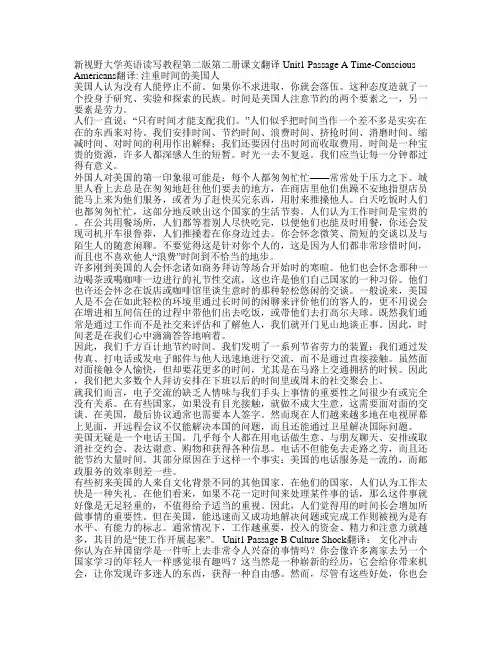
新视野大学英语读写教程第二版第二册课文翻译 Unit1 Passage A Time-Conscious Americans翻译: 注重时间的美国人美国人认为没有人能停止不前。
如果你不求进取,你就会落伍。
这种态度造就了一个投身于研究、实验和探索的民族。
时间是美国人注意节约的两个要素之一,另一要素是劳力。
人们一直说:“只有时间才能支配我们。
”人们似乎把时间当作一个差不多是实实在在的东西来对待。
我们安排时间、节约时间、浪费时间、挤抢时间、消磨时间、缩减时间、对时间的利用作出解释;我们还要因付出时间而收取费用。
时间是一种宝贵的资源,许多人都深感人生的短暂。
时光一去不复返。
我们应当让每一分钟都过得有意义。
外国人对美国的第一印象很可能是:每个人都匆匆忙忙——常常处于压力之下。
城里人看上去总是在匆匆地赶往他们要去的地方,在商店里他们焦躁不安地指望店员能马上来为他们服务,或者为了赶快买完东西,用肘来推搡他人。
白天吃饭时人们也都匆匆忙忙,这部分地反映出这个国家的生活节奏。
人们认为工作时间是宝贵的。
在公共用餐场所,人们都等着别人尽快吃完,以便他们也能及时用餐,你还会发现司机开车很鲁莽,人们推搡着在你身边过去。
你会怀念微笑、简短的交谈以及与陌生人的随意闲聊。
不要觉得这是针对你个人的,这是因为人们都非常珍惜时间,而且也不喜欢他人“浪费”时间到不恰当的地步。
许多刚到美国的人会怀念诸如商务拜访等场合开始时的寒暄。
他们也会怀念那种一边喝茶或喝咖啡一边进行的礼节性交流,这也许是他们自己国家的一种习俗。
他们也许还会怀念在饭店或咖啡馆里谈生意时的那种轻松悠闲的交谈。
一般说来,美国人是不会在如此轻松的环境里通过长时间的闲聊来评价他们的客人的,更不用说会在增进相互间信任的过程中带他们出去吃饭,或带他们去打高尔夫球。
既然我们通常是通过工作而不是社交来评估和了解他人,我们就开门见山地谈正事。
因此,时间老是在我们心中滴滴答答地响着。
因此,我们千方百计地节约时间。
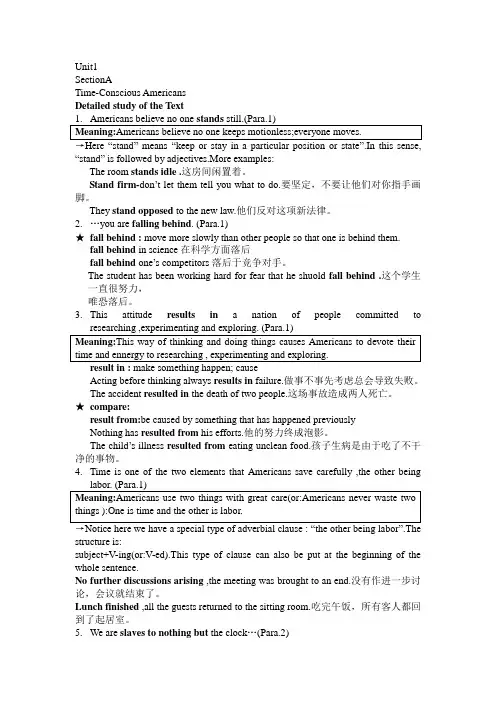
Unit1SectionATime-Conscious AmericansDetailed study of the Text“stand” is followed by adjectives.More examples:The room stands idle .这房间闲置着。
Stand firm-don’t let them tell you what to do.要坚定,不要让他们对你指手画脚。
They stand opposed to the new law.他们反对这项新法律。
2.…you are falling behind. (Para.1)★fall behind : move more slowly than other people so that one is behind them.fall behind in science在科学方面落后fall behind one’s competitors落后于竞争对手。
The student has been working hard for fear that he shuold fall behind .这个学生一直很努力,唯恐落后。
3.This attitude results in a nation of people committed toActing before thinking always results in failure.做事不事先考虑总会导致失败。
The accident resulted in the death of two people.这场事故造成两人死亡。
★compare:result from:be caused by something that has happened previouslyNothing has resulted from his efforts.他的努力终成泡影。
The child’s illness resulted from eating unclean food.孩子生病是由于吃了不干净的事物。
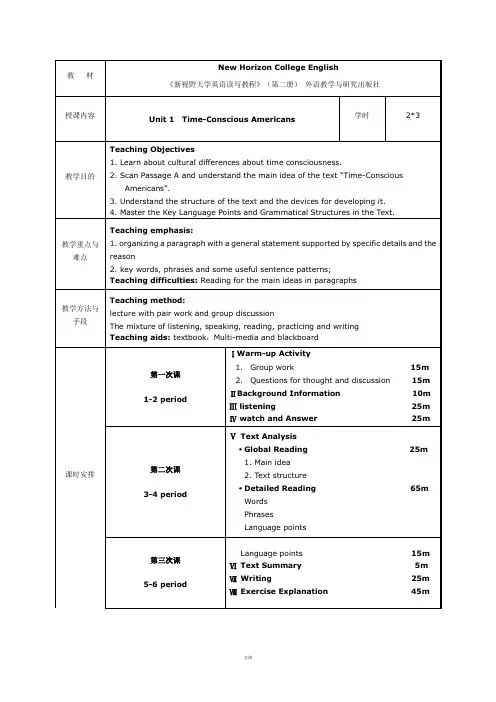
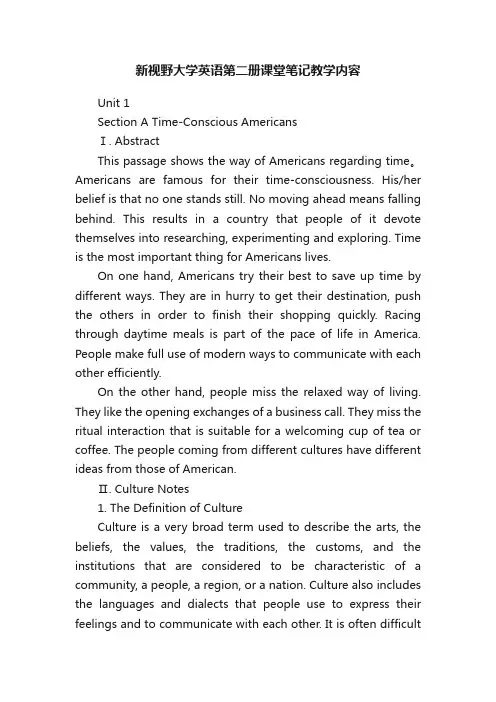
新视野大学英语第二册课堂笔记教学内容Unit 1Section A Time-Conscious AmericansⅠ. AbstractThis passage shows the way of Americans regarding time。
Americans are famous for their time-consciousness. His/her belief is that no one stands still. No moving ahead means falling behind. This results in a country that people of it devote themselves into researching, experimenting and exploring. Time is the most important thing for Americans lives.On one hand, Americans try their best to save up time by different ways. They are in hurry to get their destination, push the others in order to finish their shopping quickly. Racing through daytime meals is part of the pace of life in America. People make full use of modern ways to communicate with each other efficiently.On the other hand, people miss the relaxed way of living. They like the opening exchanges of a business call. They miss the ritual interaction that is suitable for a welcoming cup of tea or coffee. The people coming from different cultures have different ideas from those of American.Ⅱ. Culture Notes1. The Definition of CultureCulture is a very broad term used to describe the arts, the beliefs, the values, the traditions, the customs, and the institutions that are considered to be characteristic of a community, a people, a region, or a nation. Culture also includes the languages and dialects that people use to express their feelings and to communicate with each other. It is often difficultto dissociate language and culture since, in most cases, language is the main medium through which culture is transmitted. Most people feel that it is impossible to really know a culture without speaking the language. In some immigrant populations in North America, however, the original language (French, German, Chinese, Polish, etc.) has been lost but customs and traditions are still maintained2.Time Orientation CulturePast-orientated cultures believe strongly in the significance of prior events. History, established religions, and tradition are extremely important to these cultures, so there is a strong belief that the past should be the guide for making decisions and determining truth. We see this orientation in China, which because of its long and splendid history continues to respect the past.Present-orientated cultures hold that the moment has the most significance. For them, the future is vague, ambiguous, and unknown and what is real exists I the here and now.Future-orientated cultures, such as the one found in the United States, emphasize the future and expect it to be grander and nicer than the present.Ⅲ. New Words1.budget:v. plan the spending of (time, money, etc.), or provide (time, money) in the planvt.编入预算; 设计使用vi.安排开支n.预算 a.便宜的,廉价的She budgeted for buying a new car. 她为了买新汽车而计划节省开支。
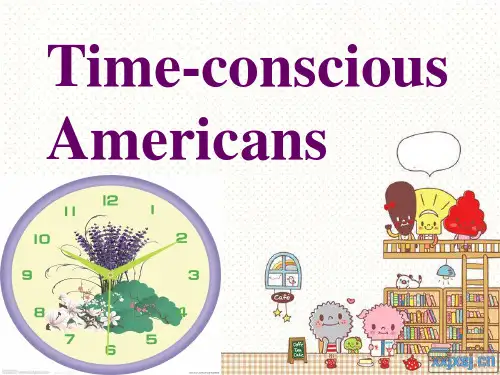
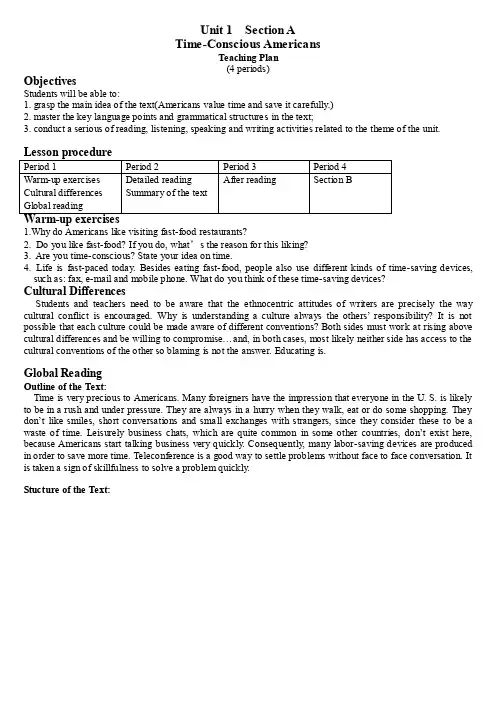
Unit 1 Section ATime-Conscious AmericansTeaching Plan(4 periods)ObjectivesStudents will be able to:1. grasp the main idea of the text(Americans value time and save it carefully.)2. master the key language points and grammatical structures in the text;3. conduct a serious of reading, listening, speaking and writing activities related to the theme of the unit.1.Why do Americans like visiting fast-food restaurants?2. Do you like fast-food? If you do, what’s the reason for this liking?3. Are you time-conscious? State your idea on time.4. Life is fast-paced today. Besides eating fast-food, people also use different kinds of time-saving devices, such as: fax, e-mail and mobile phone. What do you think of these time-saving devices?Cultural DifferencesStudents and teachers need to be aware that the ethnocentric attitudes of writers are precisely the way cultural conflict is encouraged. Why is understanding a culture always the others’ responsibility? It is not possible that each culture could be made aware of different conventions? Both sides must work at rising above cultural differences and be willing to compromise…and, in both cases, most likely neither side has access to the cultural conventions of the other so blaming is not the answer. Educating is.Global ReadingOutline of the Text:Time is very precious to Americans. Many foreigners have the impression that everyone in the U. S. is likely to be in a rush and under pressure. They are always in a hurry when they walk, eat or do some shopping. They don’t like smiles, short conversations and sma ll exchanges with strangers, since they consider these to be a waste of time. Leisurely business chats, which are quite common in some other countries, don’t exist here, because Americans start talking business very quickly. Consequently, many labor-saving devices are produced in order to save more time. Teleconference is a good way to settle problems without face to face conversation. It is taken a sign of skillfulness to solve a problem quickly.Stucture of the Text:Detailed ReadingLanguage studyA. New words and Expressions:1. fall behind:1) become bit by bit further behind2) (with) fail to finish at the proper timeEg. 1) fall behind in science 在科学方面落后fall behind one’s competitors 落后于竞争对手2) fall behind with the rent 拖欠房租The student has been working hard for fear that he should fall behind.这个学生一直很努力, 惟恐落后。
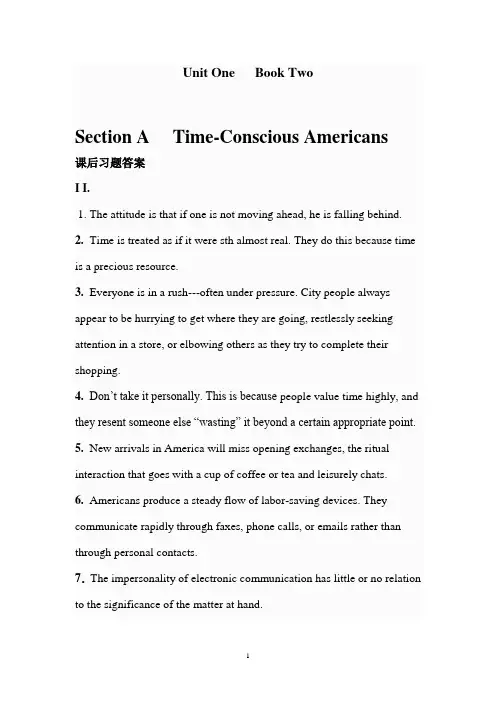
Unit One Book TwoSection A Time-Conscious Americans课后习题答案I I.1. The attitude is that if one is not moving ahead, he is falling behind.2. Time is treated as if it were sth almost real. They do this because time is a precious resource.3. Everyone is in a rush---often under pressure. City people always appear to be hurrying to get where they are going, restlessly seeking attention in a store, or elbowing others as they try to complete their shopping.4.Don’t take it personally. This is because people value time highly, and they resent someone else “wasting” it beyond a certain appropriate point.5. New arrivals in America will miss opening exchanges, the ritual interaction that goes with a cup of coffee or tea and leisurely chats.6. Americans produce a steady flow of labor-saving devices. They communicate rapidly through faxes, phone calls, or emails rather than through personal contacts.7. The impersonality of electronic communication has little or no relation to the significance of the matter at hand.8. It is taken as a sign of skillfulness or being component to solve a problem or fulfill a job with speed in the US.III.1. charge2. convention3. efficient4. obtain5. competent6. assessing7. fulfill8. conducting9. consequently 10. significanceIV.1.behind2.at3.in4.out5.to6.to7.in8.with9. but 10. forV.1-5. LCDNO 6-10. AEGIKVI.mitment2.attraction3.appointment4.impression5.civilizationposition7.confusion8.congratulation9.consideration10.explanation 11.acquisition 12.depressionVII.1.advisable2.desirable3.favorable4.considerable5.remarkable6.preferable7.drinkable8.acceptableVIII.1. much less (can he) write English articles2. much less (can he manage) a big company3. much less (could he) carry it upstairs4. much less (have I) spoken to him5. much less (to) read a lot outside of itIX.1. Having meals at home can cost as little as two or three dollars, whereas eating out at a restaurant is always more expensive.2. We thought she was rather proud, whereas in fact she was just very shy.3. we have never done anything for them, whereas they have done everything for us.4. Natalie prefers to stay for another week, whereas her husband prefersto leave immediately.5. Some praise him highly, whereas others put him down severely.X.1.She wouldn’t take a drink, much less would she stay fordinner.2.He thought I was lying to him, whereas I was telling the truth.3.How do you account for the fact that you have been lateevery day this week?4.The increase in their profits is due partly to their new marketstrategy.5.Such measures are likely to result in the improvement ofwork efficiency.6.We have already poured a lot of time and energy into theproject, so we have to carry on.XI.1.我认为他不会抢劫,更不用说暴力抢劫了。